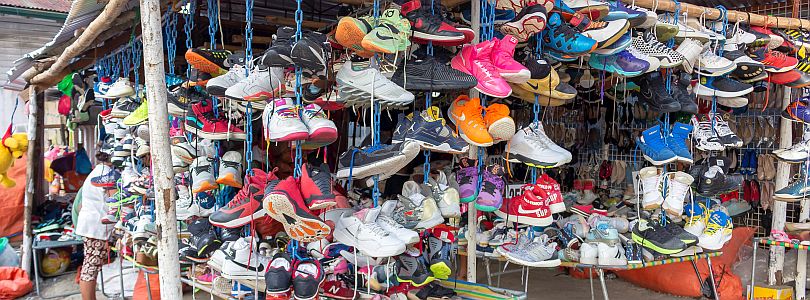Content
Enjoy your vacation — say no to fakes!

DPMA President Eva Schewior warns against buying counterfeit products on vacation - Penalties for buying counterfeits in street shops - Brand and product piracy causes immense damage - German customs seized counterfeit goods worth 417 million euros in 2024
Press release of 8 July 2025
Munich. Sunglasses for days at the beach, a jersey of your favorite football player or the long-awaited branded watch - and all at such a low price: the supposed vacation bargains are often counterfeit products. The President of the German Patent and Trade Mark Office (DPMA), Eva Schewior, appeals to consumers not to be tempted to make purchases during the vacations that play into the hands of product and brand piracy - and thus even support organized crime.
"Enjoy your vacation— say no to fakes! Act responsibly when shopping on vacation - and be critical if you are offered supposedly branded products at a low price," says DPMA President Eva Schewior. "If you buy fakes on the beach or at the street market, you are disregarding intellectual property. The trade in counterfeits harms original manufacturers, costs jobs and sometimes even endangers the health of consumers. And in many cases, fakes are distributed by criminal networks. Anyone who buys them is supporting organized crime."
A recent report by the European Union Intellectual Property Office (EUIPO) and the European police authority Europol describes how the providers of counterfeits are often part of an organized crime network. Product and brand piracy damages national economies through lost sales and taxes and costs jobs. In addition, low-quality counterfeit products can endanger people's health and safety.
Buying luxury brand sunglasses for a few euros directly on the beach: This can now cost consumers dearly. In Mallorca, in the fight against illegal street trading, where many counterfeit products are in circulation, buyers are now also being punished: according to media reports, a fine of 750 euros was imposed in one case for buying sunglasses from a street vendor. The city council of Palma de Mallorca is taking tougher action against the so-called top manta street trade with a new civic ordinance that has been in force since the end of May. Not only in Spain can the purchase of counterfeit products be punished with severe penalties - but also in Italy. High fines are also possible there.
Anyone traveling back to Germany with a counterfeit product they have purchased must expect customs to confiscate and destroy the goods. At German customs, the protection of intellectual property is in season all year round. In the fight against brand and product piracy, employees removed goods from circulation at the borders in 16,857 cases in 2024; the majority of seizures were postal items. The value of the confiscated goods was 417 million euros - more than twice as high as in the previous year (202 million euros). In its annual statistics for 2024, customs pointed out that it was not possible to identify a trend because the number and value of seized goods fluctuated greatly over the years. Where did the goods seized in 2024 come from? Just under 66% of counterfeit products came from China, just under 12% from Turkey, just under 7% from Hong Kong and just over 3% from Poland.
Throughout Europe, crimes relating to intellectual property are to become an even greater focus for police, customs and the judiciary in future - as part of the new EU plan to combat economic and financial crime. The German Patent and Trade Mark Office is involved in a national and international network for industrial property rights (patents, trade marks, designs, utility models) and against product and trade mark piracy.
The German Patent and Trade Mark Office
Inventiveness and creativity need effective protection. The DPMA is the German centre of expertise for all intellectual property rights - for patents, utility models, trade marks and registered designs. As the largest national patent office in Europe and the sixth largest national patent office in the world, it is committed to Germany’s future as a country of inventors in a globalised economy. Its almost 2,800 staff based at three locations - Munich, Jena and Berlin - are service providers for inventors and companies. They implement the innovation strategies of the Federal administration and develop national, European and international IP systems further.
Picture: Istock.com/Vera Tikhonova
Last updated: 8 July 2025

Not only protecting innovations
Social Media